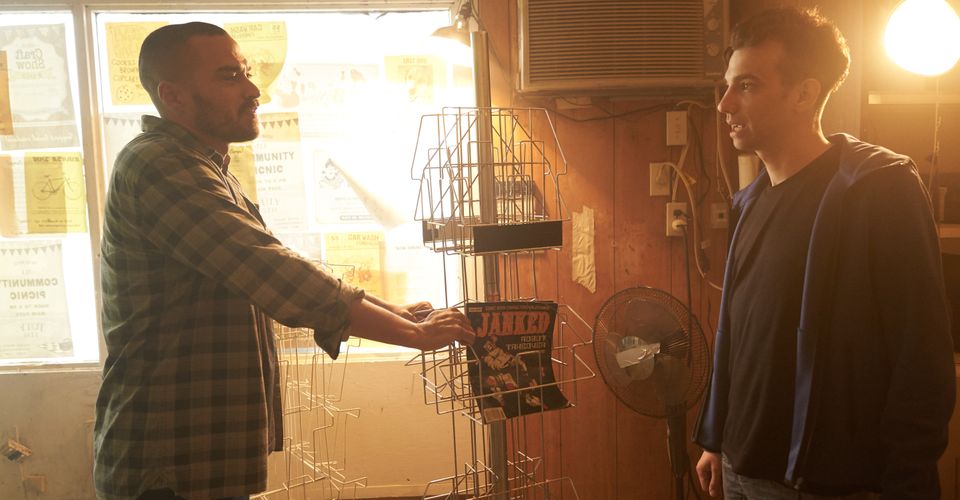Read also:
How to Watch FX Live Without CableHow To Watch AMC Without CableHow to Watch ABC Without CableHow to Watch Paramount Network Without CableJay Baruchel’s adaptation of the 2010 comic is an ugly attempt at social commentary that lacks irony or emotion.
Art imitates life. Life imitates art. It’s not the newest idea, but Random Acts of Violence says it doesn’t take many discrepancies until actions become just that—random. Here, it isn’t so much life imitating art as it is “art” imitating art. That’s the intention, at least.
The art in question is Slasherman, a somehow-successful comic series by Todd (Jesse Williams). This tortured soul has channeled his nondescript anxieties into stories based on real murders from the late ‘80s and early ‘90s. The latent misogyny—to put it generously—of the crimes have found a second life in his work, however, and while it’s found a cult following, it’s attracted even more controversy. Is he reflecting the horrors of the world, or is he exploiting them and encouraging copycat behavior? Who knows? Jay Baruchel’s film lacks both the pathos and ironic distance to get anything out of its premise.
And it’s actually a pretty simple one too. Todd and his girlfriend, Kathy (Jordana Brewster), go on a road trip with his assistant, Aurora (Niamh Wilson), and best friend, Ezra (Baruchel). They stop along the way to promote his final issue, but they come to learn that someone is committing his own “art”. Yes, a wiz in a welding mask is slaughtering innocents and posing their bodies just like the Slasherman slayings. It soon becomes not so much a question about art and “art” so much as it becomes a look at artistic integrity. It’s a problem, then, that the movie doesn’t have much of its own.

It’s the type of picture that tries to hold a mirror to society’s pop culture bloodlust only to engage in the behavior it decries. It’s the type of writing that introduces characters only to axe them off, and while that could work with a sense of nuance, Baruchel and Jesse Chabot’s script lacks that completely. Todd, for one, is an uncertain mix of audience surrogate and blank slate. Kelly, on the other hand, is nothing more than a glorified support system, and Aurora rarely registers as human. And as for Ezra? He’s utterly pointless, coming off as a cheap excuse for Baruchel to get in front of the camera.
Perhaps these characters could have passed as more intentionally shallow with a different approach. When the film introduces its knife fodder along the way and those poor saps have just as much personality, however, the blandness gets inescapable. There’s no texture to this world or its arguments, and Baruchel’s direction lacks the humor or confidence to pay off as a satire. He could have had something Verhoeven-adjacent here. Hell, he could have even had something akin to The House That Jack Built in its themes and metatext.
Jay Baruchel’s film lacks both the pathos and ironic distance to get anything out of its premise.
Maybe the source material works better. Yes, Random Acts of Violence itself is based on a comic by Justin Gray and Jimmy Palmiotti, and the adaptation toys with transmedia visuals at points. But it all but ditches these for the most part, and the technical filmmaking is so drab that it doesn’t complement the themes, much less is appealing to look at. Cinematographer Karim Hussain cakes scenes in flat blues and reds that seemed to have avoided color correction altogether. Baruchel’s staging also precludes any tension. The result is gross, and not in the good way. (The gore effects are too cheap for that.)
Had it have been cynical, the movie could have worked. Unfortunately, the world as depicted here has next to no moral compass, and it therefore has nothing to satirize. It simply can’t delineate between cynicism and bitterness, forcing its handful of promising ideas to, for the most part, go nowhere. Random? No. Pointless? Just about, even at just 80 minutes.
Random Acts of Violence is now on Shudder.